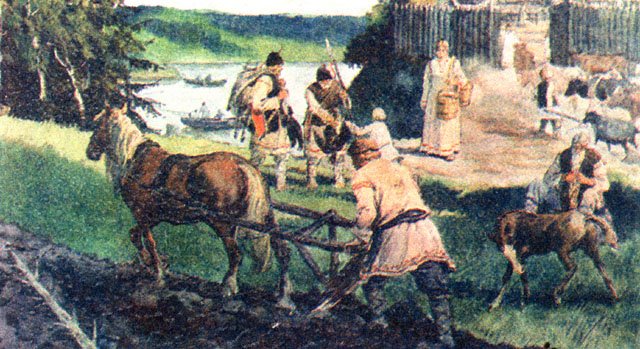Why Kosovo? Because of Kosovo's Orthodox Legacy
Although Nebojsa Malic doesn't just come out and say it, the reason why Serbia is such a magnet for imperialistic imperatives is because of the legacy left it by the actions of Tsar Lazar in defense of the True Orthodox Faith. Kosovo is an epic battle, an Orthodox vs. the decadence of the World epic battle, and few Americans want to acknowledge this because they stubbornly believe the myth that the United States stands for all that is good. It does not, and it never has. It's most revered founders and leaders have all been freemasons and deists and this cannot ever be construed to be anything but to eventually set the United States up against the True Faith and against countries that support, practice and claim the True Faith as the True Salvific Path given to mankind by Our Saviour Jesus Christ.
Below is Mr. Malic's article. Please read it, read history with an Orthodox view, pray to God to illumine you....Supporting Serbia, would actually be good for the American Nation at this point---perhaps, like Ninevah God will spare us for our sins.
http://www.antiwar.com/malic/?articleid=12086
December 20, 2007
The Die is Cast Empire's Fate is Decided
by Nebojsa Malic
Another chapter of the Kosovo crisis was closed on December 19, when the UN Security Council accepted the report of the "troika" that negotiations between Serbia and the Albanian separatists in its occupied province of Kosovo had failed. As predicted, the U.S. and its EU allies moved to proceed along the lines of the Ahtisaari Plan, rejected earlier this year by both Belgrade and Moscow – in effect, trying to sneak "independence" for the province through the back door. Expectations in Washington, Brussels and other Western capitals are that Russia and Serbia will eventually accept the fait accompli. This belief is as dangerous as it is wrong, and portends a showdown in the near future that will decide matters far beyond the Balkans.
Perhaps the greatest irony in all of this is that it was completely unnecessary.
Self-Made Trap
The 1999 illegal war against Serbia was supposed to be the crowning achievement of NATO after 50 years of existence, and provide a new role for the organization as the enforcer of American imperial ambitions throughout the world. Instead, it exposed the underlying weakness of America's European satellites, and the limitations of Empire's air supremacy.
Each subsequent conflict weakened the Empire further, destroying both its military might and political authority. Worse yet, the trampling of Serbia finally jolted Russia out of its rut, bringing about a national revival. Instead of a powerful ally in the "War on Terror," the resurgent Russia became an enemy.
In 2005, following the debacle in Iraq and Afghanistan, Bush the Lesser adopted his predecessor's Balkans policy and decided to reassert Imperial power via Kosovo. The foreign policy establishment in Washington counted on the servility of Serbian authorities, installed in power with Washington's blessing and support. To their chagrin, Serbia refused to submit! Now the Empire was trapped, unable to dictate reality through diplomacy or force, but committed publicly to the Albanian separatist cause.
Turning Point
Throughout 2006, the defeats just kept on coming. At the end of the year, all of Empire's efforts in the Balkans and elsewhere had ended up frustrated. In the political chaos following Serbia's general elections, Washington sought to seize the prize, and its agent Martti Ahtisaari proposed his plan for the "final solution" of the Kosovo crisis. Once again, however, Belgrade refused to submit. A diplomatic offensive against Moscow failed utterly and completely. By April, Ahtisaari's plan was dead; by July, it was buried.
In desperation, the Empire tried subterfuge: sending the "troika" mission, which was supposed to negotiate for 120 days. If nothing happened by that point, the Empire and its European satellites argued, the Ahtisaari plan would automatically apply.
The talks failed, of course. Having nothing to gain, Albanian separatists simply ran out the clock. Yesterday at the UN, the Empire tried to argue for independence, trotting out all the worn-out propaganda, false arguments and bluster its envoys could muster. Serbia remained adamant, as did Russia: Kosovo's status cannot change without a new resolution, and it will not pass.
American and European diplomats have hinted that they would take matters into their own hands, using the EU and NATO to force the issue. This is a bluff. Moscow has made it abundantly clear that there is no legitimacy whatsoever for this sort of action in any UN or other international document, and it is no longer willing to stand idly by while the Empire conjures quasi-legal justifications for its illegal behavior.
Lapses of the Tongue and Mind
The newly designated "Prime Minister" of the separatist government, former KLA leader Hashim Thaci, made an interesting lapsus linguae at the UN, arguing that the Albanians had waited too long for their promised independence. "We wasted a hundred years," Thaci is quoted by the AP.
How strange. Didn't the Kosovo crisis begin with the evil Slobodan Milosevic's rise to power in 1987? The confused Western observers would not know that the Albanians have claimed Kosovo as their own since 1878. Serbia's claim on the territory, based on the 1913 Treaty of London, the Albanians call an "occupation," and the Nazi conquest of the territory in 1941 is termed the "first liberation of Kosova (sic)."
Meanwhile, in Serbia, as anti-Imperial sentiment is on the rise, the strongest pro-Imperial party may just have committed a major mistake. Chairman of the Serbian parliament, Oliver Dulic, has called for a presidential election on January 20, without consulting with Prime Minister Vojislav Kostunica. This opened a rift between Kostunica and president Tadic (leader of the Democratic Party, which Dulic represents).
Many reliable analysts in Serbia now predict that Kostunica will not support Tadic in the election, but instead throw his support behind the Radical candidate Tomislav Nikolic – especially considering that the semi-official line in the West is that Tadic's victory would ensure Belgrade's compliance when the Albanian separatists declare independence in February 2008. Nikolic absolutely rejects Serbian recognition of an independent Kosovo, and openly advocates Russian military presence in Serbia.
Desperation
Why should the Empire care who governs in Belgrade? Imperial officials have frequently and publicly stated that Serbia had no say in the future of Kosovo. And yet, if that were truly the case, why all the efforts to get Belgrade's blessing – including this week's offer by EU leaders to speed up Serbia's EU application in return for giving up Kosovo? Even the Tadic loyalist and Empire-inclined foreign minister Vuk Jeremic called this an "indecent proposal," and rightly so.
Behind Empire's bluster and belligerence is desperation, and a growing awareness that their Kosovo gambit will not lead to an easy victory and popularity points in the Islamic world and at home. Despite the regular pronouncements in the media, Kosovo's independence is neither inevitable nor imminent. If it were, the Empire would have made it so by now.
This isn't 1999 any more; the Empire has very little authority in the world, and nowhere near as much power. That is why it needs legitimacy – and the only way it can legitimize the land grab is through Serbia's agreement. Belgrade isn't giving it, but the Empire and the advocates of "Kosova" believe it will. They are mistaken.
Against the Tide
Intervention in the Balkans helped bring about the American Empire more so than the 1991 Gulf War, which was fought under UN rules. The 1995 intervention in Bosnia and Croatia trampled all over UN rules and international law, but the rest of the world went along because it stopped the bloodshed. By 1999, however, it was obvious that the global hegemon was anything but benevolent.
When Otto von Bismarck called the Congress of Berlin in 1878, he hoped it would resolve the Balkans crisis. It ended up destroying his alliance with Russia, and setting the stage for the Great War in 1914. Austria started that war hoping to crush the pesky little Serbia and establish hegemony in the Balkans. Serbia survived, if just barely. Austria-Hungary did not.
What is it about this corner of Europe that keeps drawing the powers of this earth to contest their will therein? It has little strategic importance, no exceptional natural resources, and a difficult geography. Yet it remains a battlefield of ideas, armies and politics, the Tolkinesque Emyn Dagor whereupon many empires have left their bones over the centuries.
Kosovo may well be the great battle of our time. If so, its outcome has already been decided, and the American Empire will be the most recent addition to the Balkans graveyard. Of course, those leading the Empire are still convinced – and telling their people – of their imminent and inevitable triumph. The tide has turned against them a while ago, though; perhaps as early as March 24, 1999, when the first bomb dropped on Serbia and set in motion the chain of events that would propel Vladimir Putin to power.

















